Truth & Beauty: The Story of Pulp (biography)
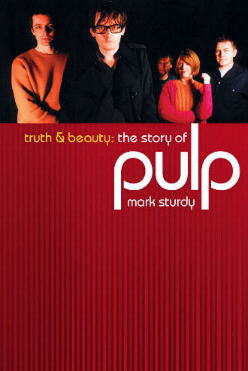
Details
Author: Mark Sturdy
Publisher: Omnibus Press
Year: 2003
ISBN: 0-7119-9599-0
Format: Paperback, 500 pages
Publisher's synopsis
Pulp are considered by many to be one of the most innovative and popular bands of the late 20th century with top ten singles including "Common People" and "Disco 2000" and acclaimed albums including "This is Hardcore" and "We Love Life". However, their history goes back much further than that. The band was formed at school by Jarvis Cocker as far back as 1978. In the 15 years it took before the band enjoyed any success, they went through copious line-ups, bizarre stories and many records. From the late 1990s, long-time Pulp fan Mark Sturdy has been uncovering Pulp's history, speaking to members, ex-members and associates of the band, from their first ever bassist David "Fungus" Lockwood through to the people who were there for those now legendary early concerts and recordings. He also talks to Jarvis Cocker's sister Saskia and band member Nick Banks. The vast majority of people interviewed have never spoken at length to the media before and the result is an exhaustive exposition of Pulp's untold story, both before and after the band's mid '90s breakthrough.
More information
So. What we have here is a great big book about Pulp. How is it different from all the other variously sized books about Pulp that have appeared over the years?
Well, it's different in a number of ways. Firstly, it's far more substantial than anything else ever written about Pulp - it's probably going to be something like 350 pages long. Secondly, it's (unsurprisingly given its length) far more accurate and in-depth. Whereas most of the other books were fairly perfunctory regurgitations of familiar press cuttings and fan club material with a few errors thrown in for good measure, I've done lots of original research, conducting around 30 interviews with members, ex-members and associates of the band, most of whom have never spoken to anyone before. I've also spent several very sad afternoons in Sheffield Library going through ancient local papers and digging out long-forgotten Pulp references. So there'll be a lot of things in the book that you didn't know before.Also, my background's quite different to most of the people who've written Pulp books in the past. You do get the impression that certain ones of those books were written in a weekend by hacks who probably knock out something similar whenever they want an extra few quid for their holidays. Hence both the detail and the fact-checking suffer. The difference is that I'd been a fan for ages before starting the book, and I've tried to write the kind of book that I'd want to read myself, rather than throwing something together quickly and collecting the cheque. I'm probably quite close to the average Pulp fan (23 years old, ex-student, got into them around 'His 'n' Hers'), so hopefully it will be the kind of Pulp book that other people want to read too.
How long has it taken you to write the book?
I had the idea in 1996, started working on it seriously in summer 1997, and it's evolved gradually from then. At the time of writing (November 2002), I'm just about to finish it.Good God, that's absolutely ridiculous. Why has it taken so long?
Well, various reasons. At first, the fact that I wasn't a professional writer (and that I was only about 17/18 years old) worked against me in that I found it difficult to get a publisher. By 1999, I'd been working on it for two years, it wasn't finished, and without a publisher there wasn't much incentive for me to get it finished, so it got put on the back burner for a while. Other things intervened over the next couple of years (I was doing a degree, and I was doing Venini's website and stuff), and it was 2001 before I got round to looking at it again. I tried my luck with publishers once more and I was lucky enough to get signed up with Omnibus Press this summer. As a result, for the past six months I've been working to a deadline for the first time ever, and it's done the trick.Give us a few examples of the kind of thing we can expect in the book then.
Well, it's the first time there's ever been a detailed history of the band's pre-fame years. Virtually every ex-member of the band from 1978 to 1983 gets to stick their oar in, so it's basically a previously untold story from that period. The period after that, I've had help from people like Russell, Jonathan Kirk (soundman and producer of 'Freaks'), and various others who worked / toured / hung out with Pulp to get a much clearer picture of the mid - '80s era than we've had before. And on the more recent stuff, I've got extensive input from Nick, Nigel Coxon (Island Records), Suzanne Catty...Have the band themselves had much involvement in the book?
Other than Nick and Russell, no. I spent a long, long time attempting to get interviews with the rest of the band, but it just wasn't happening. Disappointing, but there you go. However, at the last minute, I did manage to do a lengthy interview Nick, which was great, and the huge amount of Jarvis interviews that are already out there for me to borrow quotes from has meant that, on the whole, the book probably hasn't suffered too badly.ls there anyone else you would have liked to speak to but didn't?
Pete Mansell and Magnus Doyle would have been nice, but not being able to make contact with Candida meant I couldn't get hold of them. Tim Allcard doesn't speak to journalists, and I never did manage to find Captain Sleep. Still, the huge amount of people I did get to speak to more than makes up for such things, and there's always the second edition...How do you expect the book to be received by the world at large when it appears next Spring?
Hopefully, none of the reviews will contain the phrase "fascinating yet chilling insight into the mind of the obsessed fan." I think people will like it. It tells you a lot of interesting things about Pulp in a fairly straightforward way, so if you're interested in Pulp then it'll be just the ticket. I hope.Any thoughts on Pulp's current winding-down of activities?
Very considerate of them to delay putting the DVD out till about a fortnight after my deadline so I can't write about it. Er, no, I do think it's a shame that we're not going to have any more Pulp in the foreseeable future, and I hope there will be more one day. On the other hand, as fans, I guess we've more than had our money's worth.
Additions and Errata
Since the book’s publication in July 2003, various things have, inevitably, come to light that would ideally have been included in the book. Some of these are corrections of straightforward errors; others are substantial pieces of additional information. Either way, here they are, from the pointlessly trivial to the rather interesting.
Cover credit
Many apologies are due to Paul Burgess, who took the fabulous photos that adorn the front and rear covers of the book. For some reason Paul’s photo credit somehow fell off the page – sorry Paul.Acknowledgements
Apologies to Tony K and Boff, Dunstan and Alice from Chumbawamba for missing them out of the list of interviewees!Steven Havenhand
Page xi – I wasn’t able to trace Steven (Pulp’s bass player from 1986 to 1988) when researching the book, and in the introduction mentioned that he "doesn’t seem to be keen on speaking to the media in general". This is incorrect – he turned up out of the blue shortly after the book was completed, and tells me he would have been quite happy to talk if I’d been able to find him.Punk rock history
Page 6 – the second Sex Pistols single was, of course, ‘God Save The Queen’ not ‘Pretty Vacant’. Duh.Victoria Studios
The name, so long unremembered, of the bloke who owned Victoria Studios is Andy ‘Dogger’ Johnson. Presumably, he was therefore also the engineer on the sessions for the ‘It’ album. Ta to Alan Smyth.Mark Estdale on Pulp
Mark Estdale was engineer at Vibrasound Studios, where Pulp recorded the Bad Maureen demo tape in January 1984. He turned up shortly after the book was completed (don’t they all…) and has this to say about his recollections of Pulp in the mid ‘80s:''"My impression of Pulp at the time was a naïve cult lead by a train spotter who'd be at home on foggy dank November nights lurking in bushes outside reeking old Victorian public toilets.
You'd invariably see Jarvis scuttling in the shadows at gigs (I'm sure he had a notepad)... You'd want to offer him a bar of soap or encourage him out to be just a little less serious. You'd either think he'd had one hell of a shit childhood and was in a vortex of fucked identity, or he'd been inspired to become the messiah of brown Polyester and BO.
The enduring memory of the sessions, and probably the moment that summed them up for me was a remark I made: that the vocal mic Jarvis was using was the same as the one Cliff Richard used. The moment was salutary: the registered horror/revulsion was priceless.... I guess it was the same emotion that inspired the response to Michael Jackson.
They were obsessively intense, arty, serious, 'superior' and refreshingly into what they were doing. Jarvis with train spotter geekiness and the edgy songs of Bontempi lift music chic made them one of the most interesting bands to work with. I mixed the odd gig with them and mixed a theatre thing they did at the Leadmill. I remember them as insular, intense and zealously vulnerable."''
Manon
Speaking of trainspotter geekiness…Page 154 – the ‘New Version’ of Manon included on the Master Of The Universe 12" single is described as "barely distinguishable from the original." In fact, it’s quite different – a new vocal was recorded, and the mix is significantly changed, with a fuller, more reverby feel. Confusingly, this version is not included on the Masters Of The Universe compilation CD, which instead contains the original version. The only place to get the ‘New Version’ is on the aforementioned 12".
Captain Sleep
One of the mysteries that I never solved in the book was the true identity of Captain Sleep, Pulp's shortlived keyboard player circa 1986/87. The only definite facts seemed to be that he joined the band for a few months when Candida temporarily left, played a couple of gigs, and was then gotten rid of because he couldn't stay awake for more than two hours. No one I asked ever knew his real name, where he came from, or where he went - only that he was asleep.However, thanks to Steven Havenhand and the ever-obliging Pete Fuck, a few snippets have come to light recently. In the months since the book was completed, the following facts about Captain Sleep are now known:
- He was actually called Terry
- He'd played keyboards in another Sheffield band called The Detail (they had a female singer and played the Dolebusters festival)
- He was involved with Dolebusters, and worked on/occasionally co-presented the Radio Sheffield youth show 'ROTT'.
- He was (Pete's words) "pretty slow, bad posture, long-ish unwashed hair, very skinny, and probably smoked too much dope [...] he left [ROTT] before the programme packed up in autumn [1987]. I have a vague recollection that he was off to university in another town, although I could be completely wrong!".
- Also, Steven says: "He was called Captain Sleep because he slept all the way down to London (and back) when we played the 100 Club. I think he fell asleep before and after the soundcheck as well. He was quite small and thin. He had tousled, dark hair - a bit unshaven. He still looked quite cool though, sort of 1969/70 Neil Young cool. He wore a second hand jacket, could've been velvet."
Any additional information (his last name, etc) would be much appreciated...My First Wife
Page 158 – Nick mentions that this song was dropped from the band’s live set after one or two performances. This is semi-correct: there are two completely different versions of ‘My First Wife’. The better-known version, which appears as a live recording on the Oozing Through The Ozone Layer tape and has since been widely bootlegged, was a regular part of Pulp’s live set through most of 1987 and into 1988. However, the version that Nick was referring to was an entirely different song with the same title. This was played a couple of times in late 1986 / early 1987 and then dropped. As a result it has never been widely heard. Musically, it’s based around a slow, gentle Yamaha Portasound arpreggio and features a lengthy spoken monologue from Jarvis, surprisingly featuring several lines which later ended up in ‘My Legendary Girlfriend’ and ‘David’s Last Summer’.Zig
Mark Webber's first onstage appearance with Pulp was playing stylophone on O.U. at the Powerhaus in London on Friday December 27, 1991 - quite a bit earlier than the book suggests.Little Girl (With Blue Eyes) And Other Pieces EP
Page 438 - The actual release date was November 18, 1985, not December 2.Anorexic Beauty on Beware The Bacon Slicer
Page 451 - It’s the Ping Pong Jerry demo version.Fire Records promo releases
In addition to those listed in the discography, there also exists a 12" white label of ‘Dogs Are Everywhere’ (like the Little Girl promo, in a plain sleeve with handwritten label), a single-sided 12" white label of My Legendary Girlfriend (plain sleeve, stamped label), and a promo cassette of the Separations album (generic Fire sleeve, lists Countdown as ‘Death III’).
Launch Party
On Monday 14th July 2003, a Truth and Beauty launch party was held at The Washington in Sheffield.

"Throughout all the years I spent working on the book, I was determined that once it was done, a very big party would take place. There were a few reasons for this. As well as the obvious desire to celebrate the completion of the book and becoming a published author and all that, I'd spent a lot of time interviewing various people from Pulp's past - many of whom also happened to be people from each other's past. The result of this was that quite often, people I'd interviewed would be quizzing me on the current whereabouts of acquaintances from 20 years ago and more, and I'd sort of end up being (willingly) cast in the role of a one-man Friends Reunited. The idea of getting as many people as possible together for a dual purpose book launch / 1980s Sheffield reunion inevitably reared its head.
The obvious venue for the event was The Washington. The place is inseparable from Sheffield's musical history and, as such, had long been a haunt for most of the people I'd spoken to - indeed, Jarvis allegedly became a regular there before he was old enough to get legally served at the bar. Oh, and there's also the fact that Nick Banks co-owned the place for a good few years till 2002. It's also a lovely place - bedecked with antique radios and music memorabilia (there's a shrine to the Human League in one corner), resolutely unmodernised and about as far from the townie hell that is the modern-day West Street as you can get. Mick The Landlord was contacted, a late licence was applied for, and arrangements were made.
The day came. Fortunately, loads of people turned up - I'd been terrified that the place would either be empty or overrun with the wrong people, but there was just the right mix of Pulp-related people, friends, fans and book trade types for it to work perfectly. Nick Banks was unsurpsingly there, as were a full range of ex-members, amongst them Magnus Doyle, Tim Allcard, Peter Boam, David Hinkler, Wayne Furniss, Jim Sellars and, astonishingly, Steven Havenhand - the latter of whom had travelled all the way up from Cornwall for the occasion. There was also Richard Hawley, Alex from Pulp People, Martin Lilleker from the Sheffield Telegraph, John Quinn from the Sheffield Star, Jon Short of cello-on-It fame, John Nicholls and Nick Robinson formerly of Dig Vis Drill, Nick and Ash formerly of Venini, David Kurley formerly of New Model Soldier (he wrote the words to Anorexic Beauty, you know), and possibly even some others who didn't introduce themselves (I was spreading myself a bit thin). The place had been decorated with various Pulp memorabilia, and I'd put together a soundtrack that mixed all the obvious Pulp stuff with some contemporaneous early '80s Sheffield bands and a sprinkling of rarities that I'd managed to beg and borrow for the purpose (the latter much to the amusement of various ex-members who'd played on some of this stuff and hadn't heard it since).
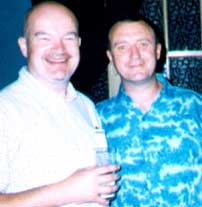
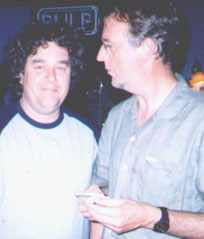
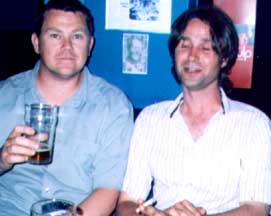
The only downside to the whole thing was finally getting to chat to a few people (Havenhand, Hawley, Allcard, Doyle - which sounds like a firm of accountants, but would be the most unlikely firm of accountants ever) I'd wanted to interview for the book but didn't get chance for various reasons. Hearing things from their perspective for the first time suggested that, despite the seven years of research and 500 pages, I'd still only done half a job. There's always something you don't know. Hey, it's all grist for the second edition.
But still. It was a fantastic night, and I can only thank, in the cheesiest possible way, everyone who came and made it as ace it was. My next project will be to find a plausible excuse to do it all again. Next year, same place, same time?"
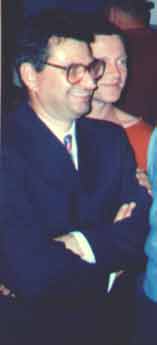

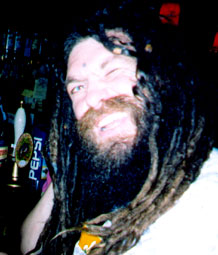
The soundtrack
(or party tape, if you must)
PART 1 - Relatives, friends and acquaintances, 1979-99: THE HUMAN LEAGUE - The Path Of Least Resistance / ARTERY - The Slide / THE COMSAT ANGELS - Ju Ju Money / VENDINO PACT - Secret Thinking / SCARBOROUGH ANTELOPES - Here We Go in Indigo / I'M SO HOLLOW - Touch / THEY MUST BE RUSSIANS - Where Have I Seen You? / ARTERY - One Afternoon in a Hot Air Baloon / HULA - Get the Habit / DIG VIS DRILL - Fix the Kitchen / CHAKK - Brain / TREEBOUND STORY - Take It / CHEVETTE - We Can Dance Again / ELECTRIC SOUND OF JOY - Our Flag / VENINI - Postcard
PART 2 - everything else: Death Comes to Town / The Night That Minnie Timperley Died / Maureen / / Separations / Fairground / The Professional / I Scrubbed the Crabs that Killed Sheffield / Lipgloss / Going Back to Find Her (live 1987) / Styloroc / Nights Of Suburbia (live 1985) / She's A Lady (Evening Session 1992) / P.T.A. / Pink Glove (Peel Session 1993) / Monday Morning / How Could You Leave Me? / The Heat Of The Day / Weeds / Rattlesnake / Didn't Feel a Thing (live 1986) / I Want You / Cocaine Socialism / Stacks / You've Got a Face (live 1982) / Something Changed / We Are The Boyz / Ansaphone / Cuckoo Song / Being Followed Home / Common People / Help the Aged / Back in L.A. / Live On / Everybody's Problem / Countdown / Babies / Have You Seen Her Lately? / Sunrise / In Many Ways / What Do You Say? / The Truth (Jayenkai's unofficial remix of The Will To Power, 2001) / The Boss / O.U. / Do You Remember The First Time? / Sorted for E's and Wizz / Paula / My Legendary Girlfriend / Last Day Of The Miners' Strike / Silence
Links
- Author's site - includes an extract